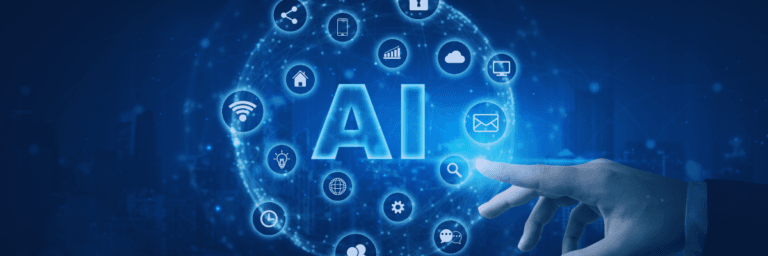Businesses are losing millions to failed projects. Poor communication, missed deadlines, and resource misallocation plague organizations worldwide. Studies show that only 35% of projects are completed successfully, while 44% of workers have experienced multiple abandoned projects without explanation.
The numbers tell a troubling story. AI in project management is projected to grow from $3.08 billion in 2024 to $3.58 billion in 2025, with a CAGR of 16.3%. By 2029, the market is expected to reach $7.4 billion and 1 in 5 project professionals now use generative AI in over 50% of their recent projects for managing project work.
In this blog, we’ll explore how AI agents are starting to change how we handle projects. These aren’t just fancy tools that sit there waiting for commands. They’re autonomous systems that actually do work for you.
Enhance Enterprise Productivity and Efficiency with Custom AI Agents
Partner with Kanerika Today.
What Are AI Agents for Project Management?
AI agents for project management are autonomous software systems designed to perform complex project tasks without human intervention. Unlike traditional project management tools that simply store and display information, AI agents actively monitor, analyze, and respond to project data in real-time.
These intelligent systems combine several key technologies:
- Machine Learning to recognize patterns from historical project data
- Natural Language Processing to understand and generate human-readable communications
- Decision Trees to make logical choices based on predefined rules and learned behaviors
- Real-time Data Processing to continuously monitor project health and team performance
Think of them as digital project assistants that work 24/7. While regular project management software requires you to input data and click buttons, AI agents can make decisions and take actions on their own.
Here’s the fundamental difference: Traditional project management tools are reactive. You tell them what to do. AI agents are proactive. They analyze patterns, predict problems, and take action before you even realize there’s an issue.
AI Agent Examples: From Simple Chatbots to Complex Autonomous Systems
Explore the evolution of AI agents, from simple chatbots to complex autonomous systems, and their growing impact.
Key Benefits of AI Agents in Project Management
1. Time Savings Through Automation
AI agents handle the repetitive tasks that consume your workday. Manual status updates, progress chasing, and data entry become automated processes. monday work management’s integrated AI tools have helped companies such as Oversight cut down on manual work by 50%, freeing up valuable time for strategic planning and creative problem-solving.
2. Improved Accuracy and Consistency
Human error in scheduling and reporting diminishes when AI systems handle routine data processing. These agents don’t experience fatigue or distraction like humans do. They process information consistently, flag data discrepancies automatically, and maintain accuracy levels that manual processes struggle to match over extended periods.
3. Enhanced Team Collaboration
AI agents eliminate communication silos by automatically distributing relevant information across project teams. They ensure stakeholders receive timely updates without manual intervention. Real-time data sharing keeps everyone aligned on project status, reducing miscommunication and improving overall team coordination throughout the project lifecycle.
4. Data-Driven Decision Making
AI project management systems analyze historical patterns to forecast project outcomes and identify potential bottlenecks before they occur. This predictive capability enables project managers to make informed strategic decisions based on concrete data analysis rather than intuition, leading to more successful project outcomes and better resource allocation.
Challenges and Things to Watch Out For
1. Balancing AI with Human Judgment
While AI agents excel at processing data and handling routine operations, they cannot replace human creativity and strategic thinking abilities. The challenge lies in finding the optimal balance between automation efficiency and human oversight. Organizations must define clear boundaries for when human intervention becomes necessary for complex decision-making processes.
2. Data Security and Privacy Concerns
AI agents require extensive access to project data, team information, and client details to function effectively. This comprehensive data access raises significant questions about information security, privacy protection, and compliance with data regulations. Organizations must implement robust security measures to protect sensitive information from potential breaches or unauthorized access.
3. Implementation Cost and Complexity
Companies struggle to achieve and scale value from AI adoption, primarily due to high upfront investments and complex implementation processes. Initial costs include software licensing, system integration, staff training, and ongoing maintenance expenses. Smaller organizations often find these financial requirements challenging to justify without clear ROI projections.
4. Managing Organizational Change Resistance
Professionals across all age groups worry AI could threaten their job security, creating natural resistance to adoption. Team members may hesitate to embrace AI agents due to fears about role displacement or unfamiliarity with new technologies. Successful implementation requires comprehensive change management strategies and clear communication about AI’s augmentative rather than replacement role.
Popular AI Agent Tools for Project Management
1. Wrike
Wrike’s approach to AI agents focuses on enterprise-grade automation with robust security measures. Their MCP Server architecture allows AI agents to access and process work data while maintaining strict security protocols, making it suitable for organizations with complex compliance requirements.
Key Features:
- Wrike’s MCP Server enables AI agents to access real-time work data, facilitating automation and insights with robust security measures
- Work intelligence features for automated task prioritization
- Machine learning algorithms that predict project risks
- AI-powered resource management for optimal team allocation
2. Taskade
Taskade transforms the traditional project management approach by letting you build custom AI agent teams. This flexibility makes it particularly valuable for organizations that need specialized AI assistance tailored to specific industries or project types.
Key Features:
- AI Agent Generator, which lets you build AI teams for specific tasks or industries
- AI Task Assistant that provides commands for due dates and format changes
- Automatic syncing to keep teams updated in real-time
- Convert unstructured ideas into organized project plans
3. Microsoft Planner with Project Manager Agent
Microsoft’s Project Manager agent represents a significant step toward autonomous project management. Unlike other tools that assist with tasks, this agent can actually execute project work independently, making it ideal for organizations already embedded in the Microsoft ecosystem.
Key Features:
- Project Manager agent takes your goals and automatically breaks them down into actionable tasks and can execute these tasks on your behalf
- Integration with Microsoft Teams for seamless collaboration
- Whiteboard feature for converting brainstormed ideas into tasks
- Loop pages for collaborative task execution and feedback
4. ClickUp AI
ClickUp’s AI implementation focuses on productivity optimization across entire organizations. Their agents excel at understanding complex dependency relationships and resource constraints, making them particularly effective for large-scale project coordination.
Key Features:
- AI-powered productivity automation for repetitive tasks
- Resource optimization based on team skills and availability
- Dependency tracking across the entire organization
- Customizable templates that adapt to existing processes
5. Zapier with AI Agents
Zapier’s AI agents serve as orchestration layers that connect multiple tools and platforms. This approach is particularly powerful for organizations using diverse software ecosystems, as the agents can coordinate workflows across different applications seamlessly.
Key Features:
- AI Agents make decisions and handle tasks on your behalf, creating a full AI-powered orchestration layer for projects
- Connection to 8,000+ apps for comprehensive workflow automation
- Custom project dashboards and client intake forms
- Automated task assignment based on form responses
| Tool | Core Approach | Ideal For | Standout AI Features | Integration Strength |
| Wrike | Enterprise-grade automation with strong security (MCP Server) | Organizations with strict compliance and data protection needs | – Real-time data processing with secure protocols – AI task prioritization – Project risk prediction – AI resource allocation | Strong internal security + enterprise systems |
| Taskade | Custom AI agent teams for industry-specific needs | Teams needing flexible, specialized AI assistance | – AI Agent Generator – AI Task Assistant (commands, due dates, formatting) – Converts raw ideas into structured plans – Real-time sync | Moderate (internal sync, less broad ecosystem) |
| Microsoft Planner + Project Manager Agent | Autonomous project execution (not just assistance) | Organizations already in Microsoft ecosystem | – Auto-breaks down and executes tasks – Microsoft Teams integration – Whiteboard → tasks – Loop pages for live collaboration | Excellent within Microsoft 365 (Teams, Loop, Planner) |
| ClickUp AI | Large-scale productivity and dependency optimization | Enterprises managing complex, interdependent projects | – AI-driven automation for repetitive tasks – Resource optimization by skills/availability – Organization-wide dependency tracking – Adaptive templates | Good across ClickUp ecosystem, API links |
| Zapier + AI Agents | Orchestration across apps (8,000+ integrations) | Companies using diverse tools that must work together | – AI makes cross-app decisions – AI-powered orchestration layer – Automated dashboards, forms, and task assignment | Excellent – connects nearly any SaaS app |
Real-World Use Cases: AI Agents for Project Management
AI agents are already transforming how organizations manage complex projects across different industries. These practical applications demonstrate the tangible benefits teams experience when implementing autonomous project management systems.
1. Intelligent Task Assignment and Load Balancing
- AI agents analyze team member workloads, skill sets, and historical performance data to make optimal task assignments
- Automatic evaluation of current capacity across teams and individual expertise levels
- Balanced workload distribution that eliminates manual availability checking
2. Proactive Risk Detection and Mitigation
- Continuous monitoring of project health indicators to identify potential risks before escalation
- Pattern analysis of delayed completions, resource conflicts, and communication gaps
- Automatic trigger of mitigation protocols when risk thresholds are exceeded
3. Automated Progress Reporting and Stakeholder Communication
- Comprehensive project status reports compiled from multiple data sources automatically
- Customized reports for different stakeholder groups with relevant metrics highlighted
- Scheduled distribution according to predefined communication protocols
4. Dynamic Resource Optimization
- Real-time monitoring of resource utilization across project portfolios
- Automatic suggestions for reallocation when underutilization or overallocation is detected
- Optimization proposals that maximize overall project performance efficiency
5. Intelligent Meeting Management and Follow-up
- Smart scheduling based on participant availability and project priorities
- Automatic capture of action items and responsibility assignments during meetings
- Post-meeting progress tracking and stakeholder updates without manual intervention
6. Predictive Budget and Timeline Management
- Historical data analysis combined with current progress patterns for predictive insights
- Early warning systems for potential cost overruns and schedule delays
- Proactive recommendations allowing corrective action weeks before issues impact outcomes
How Managers Can Adapt to AI Agents?
Successfully integrating AI agents into project management requires a structured approach that balances technological capabilities with human expertise. Organizations that follow systematic implementation strategies see higher adoption rates and better long-term outcomes.
1. Start with Strategic Assessment
Before implementing any AI agents, conduct a thorough audit of your current project management processes to identify the most promising automation opportunities.
- Identify bottlenecks where team members spend excessive time on repetitive tasks like status reporting and data entry
- Focus on high-frequency, low-complexity activities that represent the best initial opportunities for AI automation
- Prioritize areas that will deliver immediate ROI and demonstrate clear value to stakeholders
2. Implement Gradual Rollout Strategy
Avoid the temptation to automate everything at once by starting with focused pilot programs that build confidence and expertise gradually.
- Begin with single, well-defined tasks such as automated progress reporting or simple task assignment
- Allow your team to build confidence with AI agents handling routine operations first
- Expand to more complex decision-making processes only after initial success is demonstrated
3. Establish Clear Human-AI Boundaries
Define explicit protocols that specify when human intervention is required versus when AI agents can operate autonomously to prevent confusion and maintain accountability.
- Create decision matrices that specify which types of choices require human oversight
- Focus human involvement on strategic planning, client relationship management, and creative problem-solving
- Document these guidelines clearly so team members understand their evolving roles alongside AI systems
4. Invest in Team Education and Change Management
Develop comprehensive training programs that address both technical capabilities and the human aspects of AI adoption to ensure smooth transitions.
- Help team members understand AI capabilities and limitations through hands-on training sessions
- Demonstrate how AI agents enhance rather than replace human expertise and creativity
- Address job security concerns by showing how automation frees up time for higher-value strategic work
4. Monitor Performance and Iterate
Establish measurement systems that track AI agent effectiveness and provide data for continuous improvement and optimization efforts.
- Measure AI agent effectiveness through metrics including time savings, error reduction, and team satisfaction levels
- Regularly gather feedback from team members about their AI collaboration experience
- Use performance data to refine AI agent configurations and identify additional automation opportunities
Agentic Automation: The Future Of AI-Driven Business Efficiency
Explore how agentic automation is driving next-level business efficiency by enabling AI systems to act, decide, and execute with minimal human effort.
Kanerika’s Purpose-Built AI Agents for Real Business Needs
Our AI agents tackle specific workplace challenges across different industries. Each agent handles particular tasks with built-in security and intelligence that works with your current systems.
1. DokGPT – Smart Document Search
DokGPT helps you find information in documents using everyday language. It works with different file types and languages, giving you the insights you need to make better decisions faster.
2. Karl – Intelligent Data Analyzer
Karl turns your data questions into visual insights. Ask questions about your structured data in plain English and get charts and trends that fit right into how you already work.
3. Alan – Legal Document Summarizer
Alan reads through complex legal documents and creates short summaries for you. It keeps everything secure and confidential while saving you hours of reading time.
4. Susan – Personal information Redactor
Susan finds and removes personal information from documents automatically. It follows GDPR and HIPAA rules while letting you control what gets protected and how.
5. Mike – Document Accuracy Checker
Mike spots math errors and formatting problems in your documents. It explains what’s wrong and suggests fixes, so you can correct issues quickly and confidently.
6. Jennifer – Phone Call Manager
Jennifer handles your phone calls using voice commands. She can schedule meetings and collect information, helping your team stay organized without adding more staff.
Kanerika: Your partner for Optimizing Workflows with Purpose-Built AI Agents
Kanerika brings deep expertise in AI/ML and agentic AI to help businesses work smarter across industries like manufacturing, retail, finance, and healthcare. Our purpose-built AI agents and custom Gen AI models are designed to solve real problems—cutting down manual work, speeding up decision-making, and reducing operational costs.
From real-time data analysis and video intelligence to smart inventory control and sales forecasting, our solutions cover a wide range of needs. Businesses rely on our AI to retrieve information quickly, validate numerical data, track vendor performance, automate product pricing, and even monitor security through smart surveillance.
We focus on building AI that fits into your daily workflow—not the other way around. Whether you’re dealing with delays, rising costs, or slow data access, Kanerika’s agents are built to plug those gaps.
If you’re looking to boost productivity and streamline operations, partner with Kanerika and take the next step toward practical, AI-powered efficiency.
Drive Innovation and Success with Cutting-Edge Custom AI Agents!
Partner with Kanerika Today.
FAQs
Which AI project management tools are best for small teams?
Taskade and Monday.com offer excellent AI features for small teams with user-friendly interfaces and affordable pricing. Zapier with AI Agents is also great for small teams already using multiple tools, as it connects existing software seamlessly.
Are AI project management agents secure?
Most enterprise AI project management tools implement robust security measures, including data encryption and access controls. However, organizations should review each tool’s security features and ensure compliance with their data protection requirements.
How much do AI project management agents cost?
Costs vary significantly by platform. Some tools like Taskade offer free plans with AI features, while enterprise solutions like Wrike and Monday.com typically range from $10-50 per user per month depending on features and team size.
How accurate are AI predictions for project timelines and budgets?
Accuracy improves over time as AI agents learn from more project data. Initial predictions typically achieve 70-80% accuracy, which can improve to 85-95% after several months of learning from your organization’s specific project patterns.
Do AI agents work for agile project management methodologies?
Yes, many AI agents are designed specifically for agile workflows. They can automate sprint planning, track velocity metrics, predict sprint capacity, and even suggest story point estimates based on historical team performance data.










